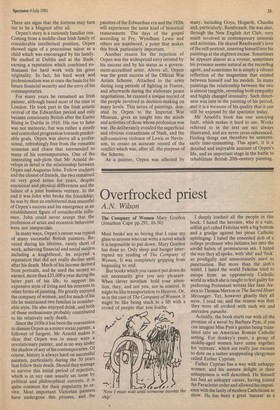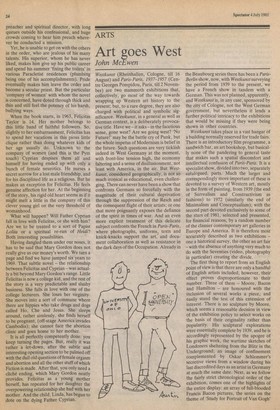Overfrocked priest
A.N. Wilson
The Company of Women Mary Gordon (Jonathan Cape pp.291, £6.50) Most books' are so boring that I raise my glass to anyone who can write a novel which it is impossible to put down. Mary Gordon has done so. Only sleep and hunger interrupted my reading of The Company of Women. It was completely gripping from beginning to end.
But books which you cannot put down do not necessarily give you any pleasure. When clever novelists hold your attention, they, and not you, are in control. It might be like transportation to Heaven. Or, as in the case of The Company of Women, it might be like being stuck in a lift with a crowd of people that you loathe. I deeply loathed all the people in this book. I hated the heroine, who is a vain, selfish girl called Felicitas with a big bottom and a grudge against her pious Catholic upbringing. I hated the conceited slob of a college professor who initiates her into the sordid habits of promiscuous sex. I hated the way they all spoke, with 'shit' and 'fuck' so prodigally and unnecessarily used as punctuation. But more than the slob's world, I hated the world Felicitas tried to escape from: an oppressively Catholic world in which she is taught to feel guilty for preferring Protestant writers like Jane Austen to Thomas Merton or The Sacred Heart Messenger. Yet, however ghastly they all were. I read on; and the reason was that they were all evoked with such wit and narrative panache.
Actually, the book starts out with all the promise of a novel by Barbara Pym, if you can imagine Miss Pym's genius being translated into an American Roman Catholic setting. For donkey's years, a group of middle-aged women have come together for 'retreats', which are really just excuses to dote on a rather unappealing clergyman called Father Cyprian. ' Father Cyprian has a way with unhappy women: and his austere delight in their unhappiness is well described. He himself has had an unhappy career, having joined the Paracletist order and allowed his impatience with the laxity of modern Catholicism to show. He has been a great 'success' as a preacher and spiritual director, with long queues outside his confessional, and huge crowds coming to hear him preach wherever he conducted a mission.
Yet, he is unable to get on with the others in the order, who are jealous of his many talents. His superior, whom he has never liked, makes him give up his public career and spend his summer 'fixing the toilets' in various Paracletist residences (plumbing being one of his accomplishments). Pride eventually makes him leave the order and become a secular priest. But the particular 'company of women' with whom the novel is concerned, have doted through thick and thin and still feel the potency of his harsh, bullying ways.
When the book starts, in 1963, Felicitas Taylor is 14. Her mother belongs to this little band of faithful followers. So, slightly to her embarrassment, Felicitas has to spend her vacations in this pious little clique rather than doing whatever kids of her age usually do. Unknown to the company of women (and this is the Pym touch) Cyprian despises them all and himself for having ended up with only a bunch of female neurotics. He nurses a secret sorrow for a lost male friendship, and for his disciplined life as a religious. But he makes an exception for Felicitas. He feels genuine affection for her. At the beginning of the story, his rigid old heart seems as if it might melt a little in the company of this clever young girl on the very threshold of womanhood.
What will happen? Will Father Cyprian fall in love with Felicitas, or she with him? Are we to be treated to a sort of Papist Lolita or a spiritual re-run of Heidi? Both interesting possibilities.
Having dangled them under our noses, it has to be said that Mary Gordon does not really give us our money's worth. We turn a page and find we have jumped six years to 1969. That subtle novel the relationship between Felicitas and Cyprian was actually a bit beyond Mary Gordon's range. Little Felicitas is now a college kid, and the rest of the story is a very predictable and slushy business. She falls in love with one of the college lecturers. She loses her virginity. She moves into a sort of commune where there are hippies who take drugs and dogs called Ho, Che and Jesus. She sleeps around, rather aimlessly, she finds herself to be pregnant, (off-stage America invades Cambodia); she cannot face the abortion clinic and goes home to her mother.
It is all perfectly competently done: you keep turning the pages. But, really it was rather a let-down, after the subtle and interesting opening section to be palmed off with the dull old questions of female orgasm and abortion and all the other stuff of which Fiction is made. After that, you only need a cliche ending, which Mary Gordon neatly provides. Felicitas as a young mother herself, has repeated for her daughter the overpowering relationship she had with her mother. And the child, Linda, has begun to dote on the dying Father Cyprian.







































 Previous page
Previous page